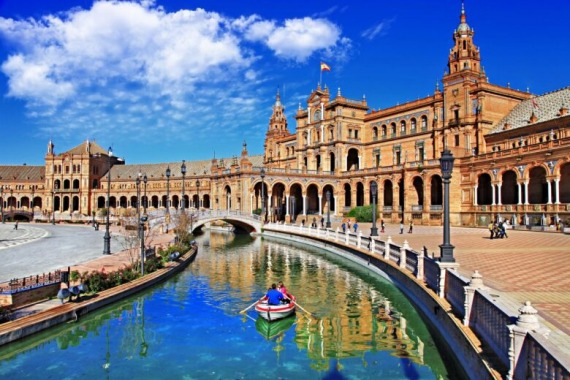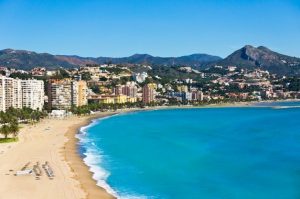Spain : Safety by City
Spain - safety as a countrySeville is the capital and largest city of the Spanish autonomous community of Andalusia and the province of Seville. It is situated on the lower reaches of the River Guadalquivir, in the southwest of the Iberian Peninsula.
Warnings & Dangers in Seville

OVERALL RISK : LOW
Seville is considered one of the safest cities in the region. The crime rate is low here. You should beware of the outskirts of the city and watch your belongings, especially during the holidays.

TRANSPORT & TAXIS RISK : LOW
Public transport is well developed and safe. Keep an eye on your wallets on buses to avoid pickpocketing. Use only licensed taxi services.

PICKPOCKETS RISK : MEDIUM
Pickpocketing occurs in Seville at every turn, so wear an anti-theft backpack, look after your belongings, and don't leave your phones and wallets unattended. In crowded places, keep an eye on your surroundings.

NATURAL DISASTERS RISK : LOW
The city is not subject to any serious risks of natural disasters.

MUGGING RISK : LOW
The risk of serious robbery and armed attacks is shallow in Seville. There is little danger of these attacks in the suburbs. However, the likelihood that you will be attacked is minimal

TERRORISM RISK : MEDIUM
In the past, Spain has become a target for terrorist attacks, so this risk cannot be completely ruled out. Study the political environment and news before your visit here.

SCAMS RISK : LOW
Fraud is commonly associated with street vendors offering counterfeit goods to tourists. Don't buy them even if the price is very attractive. Also, only withdraw money from ATM at banks with cameras to avoid skimming your card.

WOMEN TRAVELERS RISK : LOW
Women traveling alone can feel quite safe in Seville. The main thing is to adhere to the usual precautions and monitor your surroundings.
How Safe Is Seville for Tourists?
Seville is a very safe city to travel to.
The crime index here is at a low level.
The main problems are related to corruption and petty theft.
The city is considered to be one of the safest in Spain.
The streets are well lit, and public transport is reliable and safe.
Most often, petty theft of personal belongings occurs here.
Therefore, never lose your vigilance and keep an eye on your belongings.
Pickpockets are especially numerous in the historical center and tourist places.
They rely on onlookers who don’t look around.
The poorest and (because of this) unsafe area is Tres Mil Viviendas.
Keep your passport and important things in the hotel safe and carry a minimum of cash with you.
Do not leave bags and phones out of sight – pickpockets quickly pick up such things.
Salamanca is a fairly safe city to travel to, and most tourists won’t have any problems here.
Serious attacks and violent crimes are few.
And they have nothing to do with tourists and visitors.
Cheating and petty theft on the streets of the city happen quite often.
Taxi drivers can also try to deceive tourists.
Therefore, it is important only to use licensed official taxi services.
Do not get involved in a drunken showdown, and do not trust those who ask or offer you help.
Do I Need a Visa to Visit Seville?
A visa is not required for visits of up to 90 days in a 180‑day period for nationals of those countries for which the European Community has abolished the visa requirement. A valid passport is a must.
Which Currency Is Used in Seville?
Like many countries in the EU, Spain uses the Euro. The euro is the official currency of 19 of the 27 member states of the European Union. The euro, which is divided into 100 cents.
How's the Weather like in Seville?
In Sevilla, the summers are short, hot, arid, and mostly clear, and the winters are cold and partly cloudy. The best time of year to visit Sevilla for hot-weather activities is from early June to mid-September.
What Do I Need to Know about Airports in Seville?
Seville Airport is Seville’s main airport and Andalusia’s second airport after Malaga Airport. In 2009, Seville Airport handled 4,051,392 passengers. The airport has one terminal and one airstrip.
Should I Get Travel Insurance for My Travels?
A travel insurance policy is a must when visiting a foreign country or city. Make sure you got it before starting your journey; the customs officer may ask for it.
What Are Some Things to Do in Seville?
Seville is the capital of the autonomous community of Andalusia in southern Spain. It is known as the birthplace of flamenco dance, centered in the Triana district. The city’s main attractions are the richly decorated Alcazar fortress, built during the reign of the Moorish dynasty of the Almohads, and the Maestranza bullring of the 18th century. The Gothic-style Seville Cathedral, which houses the tomb of Christopher Columbus, is famous for its Giralda bell tower, which originally served as a minaret.
Is the Water in Seville Safe to Drink?
Tap water is safe to drink.
Is Uber Safe in Seville?
There is an Uber taxi in the city; you can call a taxi from your smartphone application. The fare will depend on the time of day and the distance traveled.




